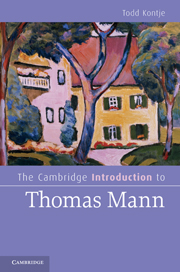Book contents
- Frontmatter
- Contents
- Chronology
- 1 Introduction
- 2 Origins, influences, and early mastery
- 3 Artists and outcasts in Mann’s early fiction
- 4 From world war to the Weimar Republic
- 5 The struggle against National Socialism
- 6 A pact with the devil: Doctor Faustus
- 7 Tribulations and final triumphs
- Notes
- Suggested further reading
- Index
5 - The struggle against National Socialism
Published online by Cambridge University Press: 05 September 2012
- Frontmatter
- Contents
- Chronology
- 1 Introduction
- 2 Origins, influences, and early mastery
- 3 Artists and outcasts in Mann’s early fiction
- 4 From world war to the Weimar Republic
- 5 The struggle against National Socialism
- 6 A pact with the devil: Doctor Faustus
- 7 Tribulations and final triumphs
- Notes
- Suggested further reading
- Index
Summary
Thomas Mann’s fame rose to new heights in the years between the publication of The Magic Mountain in late 1924 and Hitler’s seizure of power on January 30, 1933. Mann lectured frequently in Germany and throughout Europe, was a prominent member of the PEN Club, and was awarded the Nobel Prize for Literature. The times were nevertheless trying for Mann, as the political movement that he had dismissed as nonsense in 1921 was proving very serious indeed. As the power of the National Socialists grew, Mann became increasingly vocal in his opposition to them. At times Mann intervened directly in political discussions, most famously in his 1930 “Address to the Germans: An Appeal to Reason” (“Deutsche Ansprache: Ein Appell an die Vernunft”). Mann spoke on October 17, 1930 in the same hall in Berlin in which he had delivered “The German Republic” in 1922; then he had spoken in the wake of Rathenau’s assassination, now he spoke in the immediate aftermath of the National Socialists’ first major victory at the polls.
Mann begins by noting that he was supposed to read from his new novel, but that such a reading would be inappropriate under the circumstances. Instead, he urges the Germans in the strongest possible language to turn away from fanaticism, from a “dictatorship of violence,” from “politics as the mass opiate of the Third Reich,” and to work instead for greater human dignity, rationality, and a responsible Social Democracy. Goebbels had gotten wind of Mann’s intentions shortly before the event and sent twenty SA men in rented tuxedos to disrupt the lecture. Mann spoke over a mixture of heckling and applause and then managed to exit the hall through a little-known passageway with the help of the conductor Bruno Walter, who had performed frequently in the building and was familiar with its nooks and crannies.
- Type
- Chapter
- Information
- The Cambridge Introduction to Thomas Mann , pp. 73 - 100Publisher: Cambridge University PressPrint publication year: 2010



